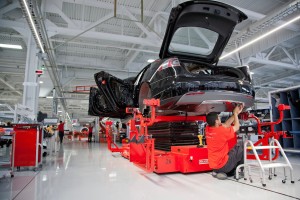
Tesla and Panasonic formally announced their plans to partner in the development of the new "Gigafactory" to make batteries for electric vehicles.
Electric carmaker Tesla Motors today formally locked down its alliance with Japanese electronics giant Panasonic, the two confirming they will move ahead on a planned $5 billion “Gigafactory” that is expected to become the world’s largest lithium-ion battery plant.
Tesla had earlier announced plans to build the Gigafactory, which it said was essential to its goal of taking battery cars to a more mainstream market segment with the launch of its $35,000 Model 3 later this decade.
The partners revealed a number of new details about the battery plant as it confirmed signing a deal with Panasonic, but one fact remains unknown: where the Gigafactory will be built. The maker is considering five states for the project, which will eventually employ as many as 6,500 workers: Arizona, California, Nevada, New Mexico and Texas.
“The Gigafactory represents a fundamental change,” J.B. Straubel, Tesla’s chief technical officer, said in a statement. “Not only does the Gigafactory enable capacity needed for the Model 3, but it sets the path for a dramatic reduction in the cost of energy storage across a broad range of applications.”
(Click Here for more on Tesla’s plans for the Model 3.)
The factory will serve as Tesla’s primary source of lithium-ion batteries, and CEO Elon Musk previously expressed his goal of not only providing more of the batteries but also driving down their cost while improving their capabilities. Industry analysts have long argued that for electric vehicles to go mainstream, batteries need to be lighter, more powerful and significantly cheaper.
(For a wrap up of VW’s quarterly earnings, Click Here.)
As recently as the beginning of the decade, lithium-ion batteries cost as much as $1,000 per kilowatt-hour, a stiff cost premium, even for a vehicle like the current Tesla Model S, which can carry a sticker price of as high as $110,000. Batteries are the single largest cost in the production of that sedan, which offers buyers battery pack options as large as 85 kWh.
As they locked down their new partnership, Tesla and Panasonic revealed that:
- The California EV maker will handle the acquisition of land, and oversee the construction of the factory and related efforts, and will be in charge of the Gigafactory;
- Panasonic will provide the investment for the battery line itself and handle production of the batteries, though Tesla will then assemble the individual cells into battery packs for its vehicles;
- Tesla will continue purchasing some batteries from Panasonic’s Japanese plants;
Battery prices have already begun to fall. By some inside estimates, makers are now getting more powerful cells at prices approaching $400 per kilowatt hour. Nonetheless, studies by various analysts, including the Boston Consulting Group, have suggested that this needs to get down to around $200 to make a battery-electric vehicle like the upcoming Model 3 not only profitable but cost competitive with conventional gasoline power.
(Copenhagen Wheel makes any bicycle an EV. For more, Click Here.)
“I believe that once we are able to manufacture lithium-ion battery cells at the Gigafactory, we will be able to accelerate the expansion of the electric vehicle market,” said Yoshihiko Yamada, a Panasonic executive vice president in a statement, adding that he is confident the new batteries produced there will be both more powerful and cheaper to produce.
The formal signing of the deal comes just weeks after Tesla announced the Model 3 program which will go into production around 2017. It will be the third vehicle in the Tesla line-up, following the launch of the Model X battery SUV early next year.
Tesla will announce its second-quarter earnings later today.

Ah, tesla. Another 100 million down the drain and it’s only the second quarter. After reading the Edmund s long term assessment on the S, I give them 2 more years and they will be cooked, just like their battery pack.
Hopefully they will have an improved protection package / system for the Model 3 than on S. The SUV should not be as prone to the low CoG as the sedan(s). With their knowledge on the e-RAV4 program the “X” should do well.